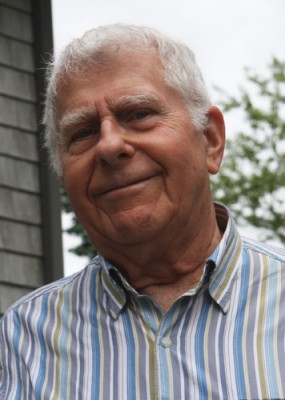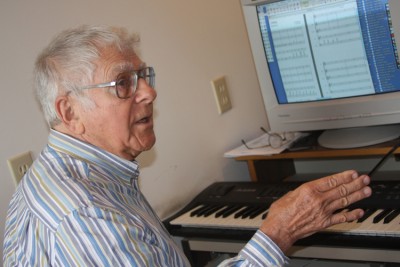 Award-winning composer William D. Pardus, ’58, ’59, ’60, has been recognized with the Director’s Prize in the International Composers’ Competition, sponsored by the Longfellow Chorus of Portland, Maine for his composition – FIVE SONGS of the SEA (for soprano voice and piano) which was part of a project of setting ten Longfellow poems to music, with varied types of accompaniments.
Award-winning composer William D. Pardus, ’58, ’59, ’60, has been recognized with the Director’s Prize in the International Composers’ Competition, sponsored by the Longfellow Chorus of Portland, Maine for his composition – FIVE SONGS of the SEA (for soprano voice and piano) which was part of a project of setting ten Longfellow poems to music, with varied types of accompaniments.
The event sounded the latest high note of this Neag School of Education alum’s long and varied career.
One of his major works, composed several years ago, an innovative musical piece that reflects the lives and times of the mill workers from his hometown of Willington, CT and of other New England mill towns.
Called “Mills of New England,” the 22-minute work premiered at the Eastern Division of Music Educators National Conference, where Pardus — professor emeritus and former Keene State College music department chairman — was an invited speaker.
Pardus, 81, said he composed the sounds of each movement of “Mills of New England” to represent the many aspects of the mill workers’ lives, which included several generations of his own family. The first movement, for example, illustrates through music, the bricks, windows and workers of the mills. The second movement paints a musical picture of the rows of gray company houses. The other movements explore labor unrest and the immigrants who came to the United States to work in the mills, among other topics.
Clearly, retirement does not equate with rest for Pardus. Since retiring from Keene State 15 years ago, he’s founded a music publishing company called Creation Station, where he uses specialized computer technology to compose and record his music, which these days focuses mostly on woodwind, brass and percussion compositions.
It’s cutting edge music technology. But for anyone who knows Pardus, it’s what one would expect. In the 1980s, Pardus updated how music was taught at Keene State by establishing an electronic music studio. He also worked closely with electronic music pioneer Robert Moog, who in the 1970s invented the first widely used synthesizer.
“At one time, I thought about going into electrical engineering, but I guess music was too much of an attraction,” Pardus said. “Music was in my heart and soul.”
Indeed, Pardus has almost always been a musician. He started learning piano at age 6 and, in high school, played jazz and polkas with local bands. During this time, he also attended the Hartford Conservatory of Music, where he was given the opportunity to study, arrange and compose with the well-known arranger for Patti Page, Asher Zlotnick. The other aspects of his life at this time included working as a lithographer at the UConn College of Agriculture while waiting to get drafted into the U.S. Army. The Korean War had just begun.
And for Pardus, the military led to discoveries. The Army gave him the opportunity to attend a military-run electronics school. Based in New Jersey, he learned to construct radar equipment, as well as how to train other soldiers to use the technology. Music also continued to be a part of his life performing frequently in New Jersey while still in the Army.
Pardus remembers the learning opportunities during this time as “incredible.” They were also life changing when the college-educated engineers he worked with encouraged and inspired him to consider a career in higher education.
This new goal led Pardus to UConn, where while he studied to be a music teacher he played in jazz bands and many gigs on campus. In those years — the mid-1950s — jazz was in full swing. When bands like The Beatles made pop and rock a more popular genre, Pardus looked for ways to stay involved in jazz, swing and similar music forms. It led to a job as a band director at East Hartford High School, where Pardus stayed for six years.
At the high school, he built the music program from what he calls a “hapless, disjointed group, to one of the best in the state.” Along the way, he went back to UConn to earn a teaching certificate and then a master’s in Education. He also continued to perform with UConn musical groups both on and off campus.
Recognition for his work and passion came in the form of an invitation to teach at England’s Norwich College of Education as a Fullbright Scholar. “It was quite an honor,” he recalled. With his experience and MA from UConn, he was also able to teach at Eastern Connecticut State University as an adjunct professor.
During the Fulbright experience, he realized that teaching college students was his true passion, and he was recruited to join Keene State College as its Music Department chair. After stepping down as chair, he continued to teach music arranging, American music and jazz history.
Pardus came across another opportunity to go abroad during a1994 sabbatical, when he was a visiting professor in residence at the United Kingdom’s University of Keele. “I lectured on jazz and American music,” he recalled. He also used his expertise to help them establish a “cutting edge” music studio.
But no matter what he was doing in the classroom, Pardus never stopped taking the stage as a musician. For years, he performed as a jazz keyboardist, as well as founded the Keene Jazz Ensemble that, during his tenure, performed more than 300 concerts.
“We played at almost every high school in New England, which was a great recruiting tool for Keene State,” he said. “We were also honored to be invited to national conferences of music educators.”
During this time, he also continued to present on musical technology at local, regional and national workshops and seminars.
His composition credits include 60 published works for brass, woodwinds percussion and voice. He has also composed numerous electronic scores for the Keene State College Dance Department. His many accolades include being elected to the New Hampshire Music Educators Association Hall of Fame and he was selected by the New Hampshire Music Teachers’ Association as “The 2001, 2004 and 2008 NHMTA Commissioned Composer”. After presenting a music education workshop to UConn music students in 2010, he presented copies of each of his compositions and arrangements to the UConn Music Department and its Music Library.
Although not as tuned in to the latest music technology advancements as he was in the 1970s and ’80s, Pardus still keeps tabs on the industry through the work he performs in his two music studios – the partial studio he established in his Rhode Island summer home, and the full one at his home in New Hampshire.
 “Writing music on computers saves the countless hours of hand-writing scores and parts for each musician,” he noted, then joked: “Using computers was the product of my fundamental laziness — the same laziness that kept me from writing music consistently until the end of my teaching career.”
“Writing music on computers saves the countless hours of hand-writing scores and parts for each musician,” he noted, then joked: “Using computers was the product of my fundamental laziness — the same laziness that kept me from writing music consistently until the end of my teaching career.”
Along with his wife, Barbara, Pardus has had the pleasure of seeing his love for both higher education and music continue through his three children. They all graduated from college (daughter, Julie, from UConn) and have various levels of musical interest. He enjoys spending time with them, along with his six active grandchildren.
He also enjoys seeing young people enjoy music making: “In the 1970s and 1980s, I was on the leading edge of this. Now, for crying out loud, junior high kids have access to this technology and are out doing the same stuff I was doing. It’s incredible.”
 Facebook
Facebook
 Twitter
Twitter
 LinkedIn
LinkedIn
